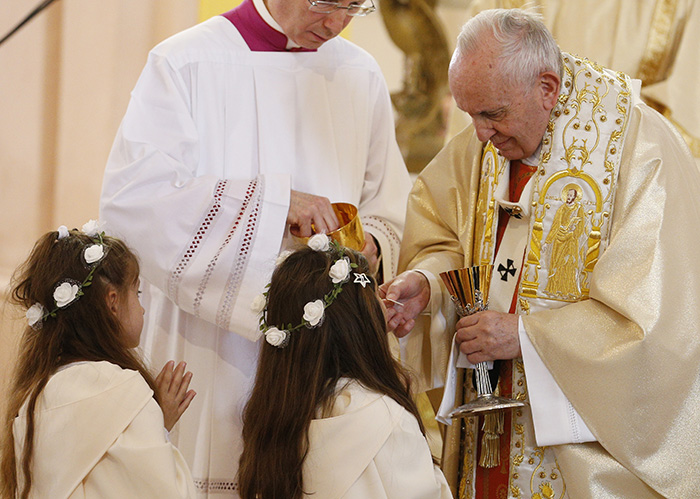Rev José Mario O Mandía
jmom.honlam.org
Several things are needed for a person to be able to receive Holy Communion.
(1) He must be a baptized Catholic. As we have seen, Holy Communion signifies that a person is in communion with the Catholic Church and fully adheres to all its teachings.
(2) He must be in the state of sanctifying grace, i.e., he must not be aware of having any unconfessed mortal sin (cf Code of Canon Law, canon 916). “Whoever, therefore, eats the bread or drinks the cup of the Lord in an unworthy manner will be guilty of profaning the body and blood of the Lord. Let a man examine himself, and so eat of the bread and drink of the cup. For any one who eats and drinks without discerning the body eats and drinks judgment upon himself” (I Corinthians 11:27-29).
(3) He must be in full communion with the Church. For this reason, persons “who have been excommunicated or interdicted after the imposition or declaration of the penalty and others obstinately persevering in manifest grave sin are not to be admitted to Holy Communion” (Code of Canon Law, canon 915).
(4) He must observe the Eucharistic fast. “A person who is to receive the Most Holy Eucharist is to abstain for at least one hour before Holy Communion from any food and drink, except for only water and medicine” (CCL, canon 919, section 1).
Any exceptions to this rule? Yes, there are.
(4.1) “A priest who celebrates the Most Holy Eucharist two or three times on the same day can take something before the second or third celebration even if there is less than one hour between them” (CCL, canon 919, section 2)
(4.2) “The elderly, the infirm, and those who care for them can receive the Most Holy Eucharist even if they have eaten something within the preceding hour” (CCL, canon 919, section 3).
(5) Children who have “sufficient knowledge and careful preparation” (CCL, canon 913, section 1) and “children in danger of death” can receive Holy Communion “if they can distinguish the body of Christ from ordinary food and receive communion reverently” (CCL, canon 913, section 2).
Canon 914 further lays down: “It is primarily the duty of parents and those who take the place of parents, as well as the duty of pastors, to take care that children who have reached the use of reason are prepared properly and, after they have made sacramental confession, are refreshed with this divine food as soon as possible. It is for the pastor to exercise vigilance so that children who have not attained the use of reason or whom he judges are not sufficiently disposed do not approach Holy Communion.”
Can one receive Holy Communion more than once a day? “A person who has already received the Most Holy Eucharist can receive it a second time on the same day only within the Eucharistic celebration in which the person participates, without prejudice to the prescript of canon 921, sect. 2” (canon 917).
Is there an obligation to receive the Eucharist? Catholics are obliged to receive Holy Communion at least once a year, preferably during Easter Time (cf canon 920) and are especially encouraged to do so and receive Holy Viaticum if they are in danger of death (cf canons 921-922).
Is it possible for a Catholic of the Latin Rite to receive the Eucharist in another rite? Canon 923 says, “The Christian faithful can participate in the Eucharistic sacrifice and receive Holy Communion in any Catholic rite, without prejudice to the prescript of canon 844.”


 Follow
Follow


